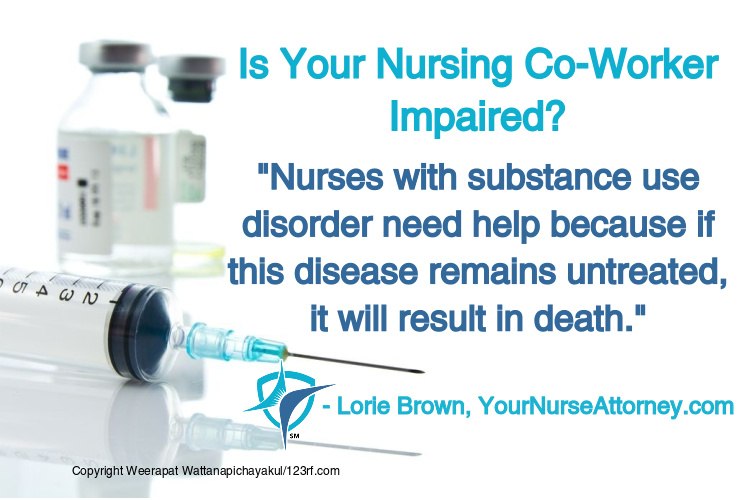
Did you know that approximately 10% of the U.S. population has a substance use disorder? Such abuse can affect anyone regardless of age, sex, race, ethnic background or economic class. Although it has not been proven, I suspect that the percentage is higher in the health care professional population due to the ease of access to drugs.
As part of the disease, those with a substance use disorder will lie and deny to hide from others that they have a problem. Therefore, if you have a coworker with a substance use disorder, they will do what they can to protect themselves which can mean blaming other people. Nurses with substance use disorder need help because if this disease remains untreated, it will result in death.
Trying to get someone with a substance use disorder to admit it, can be difficult. But since your license is also at stake, you need to be wary and careful. If you know the signs and symptoms of substance abuse disorder, you may be able to both help your coworker and protect yourself.
What happens to people with substance use disorders, there is a part of the limbic system referred to as “the pleasure
Prolonged use of a chemical causes the brain to stop making the dopamine leading to loss of control. This causes them to go to extraordinary measures to seek out chemical substances to recreate those feelings of euphoria. Since addiction is a disease, it can be successfully treated. However, to get treatment a person must admit that they have a problem.
For those of us who do not have
Things that contribute to substance use disorder are, first, nurses are knowledgeable, know how drugs work and feel competent to self-prescribe. Secondly, nursing is a very stressful profession leading to the use of substances to relieve that stress.
According to the National Council of State Boards of Nurses, APRNs, who are nurse
- Absences from the unit for extended periods.
- Frequent trips to the bathroom.
- Frequently arriving late and/or leaving early.
- Excessive numbers of mistakes including medication errors.
- Subtle changes in appearance that escalate over time.
- Wearing long sleeves in warm weather.
- Increasing isolation from colleagues.
- Inappropriate verbal or emotion responses.
Confusion, diminished alertness or memory lapses.- Calling in sick after a weekend or a holiday.
Physical signs may include: shakiness, hand tremors, slurred speech, constricted or dilated pupils (diaphoresis), unsteady gait, and runny nose. If you suspect one of your co workers to have a problem, talk to your nurse manager. Two nurses died in the bathroom of the same hospital years apart with a syringe containing fentanyl in their arm. The more alert we become to the signs and symptoms of substance abuse, we can hopefully help our co workers. I know you do not want to falsely accuse someone but you could be saving their life.
Have you worked with an impaired co worker? What did you do? Does your facility have policies and procedures in place for guidance on what to do with your suspicion? I would love to hear your comments below.








alice says
By the number of cases before the Board of Nursing positive drug tests, not wasting properly, Dui’s I suspect the number is higher among nurses.
I have also seen false allegations , with no evidence.
Another case.:
I had the link but does not allow posting so Dr Yolanda NG. pediatric nephrologist lost her license due to legally used MJ use for menstrual cramps lost her career. (wash)
A growing racket for Boards. (google )
sheila west says
HI Lorie,
I have worked with 3 nurses who had substance abuse problems. I did not know about it until they lost their jobs. I would like to think that the nurses today will receive better support from the workplace before terminating them..
I may be too optimistic.
LORIE A BROWN, R.N., M.N., J.D. says
Thanks for your comment Sheila. Many hospitals are willing to work with nurses who voluntarily seek help from the EAP before the start diverting. Once diversion starts, the many hospitals consider it theft and can result in criminal charges. That is why it is important that we help our co workers so they can get the help they need.